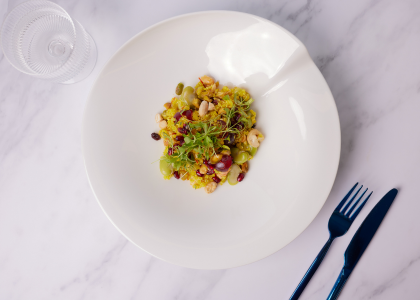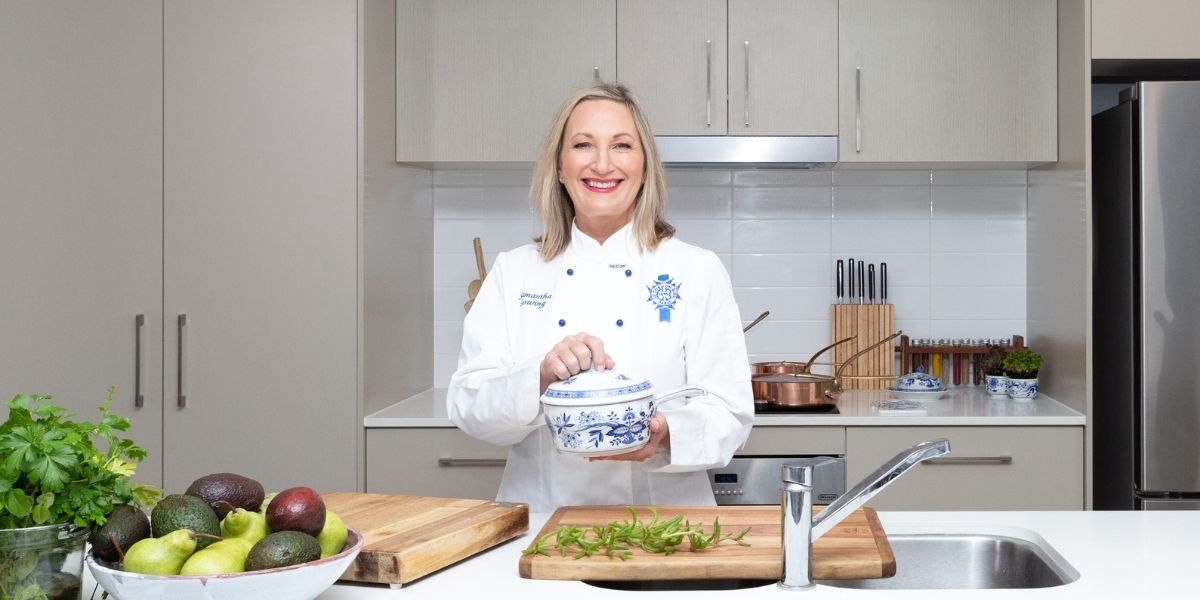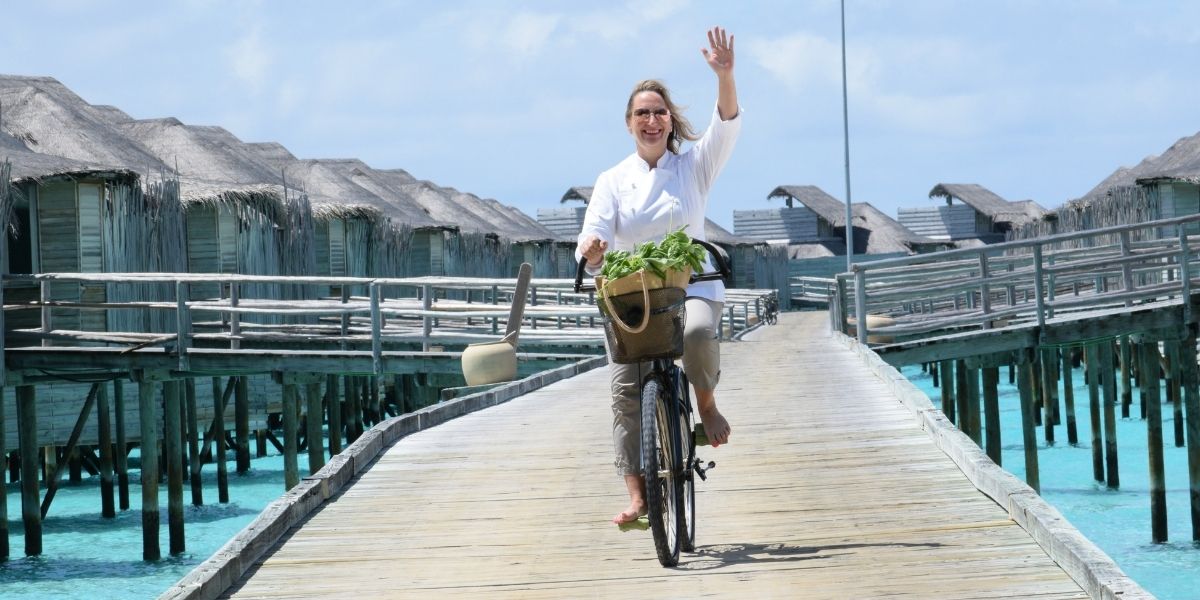
A plant-based recipe to celebrate great chefs around the world
This International Chef's Day, we're raising a fork to the hard-working and passionate chefs across the world, including Le Cordon Bleu chefs in training, ...

When I lost my father to cancer, I felt I had a duty of care to think about the food that we were serving at my hotel, Gowings Grace Darlings Hotel [in Melbourne, Australia]. I wanted to make a change. In the 90’s, it wasn’t feasible to introduce a healthy menu to an old gastro pub. Seasonal produce, kitchen gardens and growing medicinal leaves weren’t really a thing. But I had a gut feeling. I wanted to help people realise that healthy food didn’t have to be just brown rice and lentils. So, I retrained to become a qualified Clinical Nutritionist and began my organic cooking school called ‘Don’t Panic, it’s Organic’.
I set about marrying my life as a Hotelier and Restaurateur with my new life as a Clinical Nutritionist. I thought, one day, wellness will be taken seriously. One day, an integrative ‘food as medicine’ approach will be recognised worldwide as a powerful healing force and as a gastronomic influence. And now, it has!
I certainly have a healthier approach to life and longevity. It has changed the way I look after my community, my body, my self, those around me and my greater networks. It’s really made me understand what we should and shouldn’t be consuming, plus the contributing factors to degenerative disease. There is so much we can slow down by incorporating health-conscious cuisine into our daily diet, without being too dogmatic. A happy and healthy approach but also an understanding, particularly in lockdown, that pizza and wine is absolutely fine (in moderation)!
Studying and understanding a Chinese medicine-approach to healing with foods has also been pivotal for me. You can’t argue with thousands of years of ancient wisdom and modern medicine integrated! Eastern and Oriental culture has become entrenched into my ways and my own philosophies. It probably stemmed from my childhood, I’ve studied the Japanese language since I was nine and I loved Chinese food as a child growing up in Melbourne, Australia - Chinatown in Melbourne is a very special place.
I studied other methods as well, such as Ayurveda, particularly in my yoga studies and practice. But Chinese medicine really resonates with me with its intuitive approach to treat the body as a whole system. Chinese cosmology, which is based around Confucius, and Chinese Daoist philosophies also come into play. Chinese medicine integrates yin and yang and we can see that in daily life - ‘dark and light’, ‘day vs night’- from a food perspective, we have heating and cooling foods. For example, heating foods might be ginger and cooling foods might be cucumber or celery. Both of those food groups have medicinal applications on the body and Chinese medicine really nails that.
Sam Gowing is Australia's spa cuisine guru.
She is a font of wisdom when it comes to tasty, healthy eating!
-Matt Preston, MasterChef Australia
I wanted to renovate spa cuisine. You used to go to a health spa, day spa or a retreat and have this beautiful, restaurant-style light cuisine. The portions were very small, very diet-focused and calorie-controlled (within reason). After I learned to surf about 14 years ago, I was inspired to incorporate elements of the ocean into ‘Surf Spa Cuisine’, which I call ‘Surf Spa Food’. It was more abundant, still very healthy, but fresh and lively as I would incorporate ingredients like seaweed and fish. I align this with what resorts and spas have to offer, such as foods rich in collagen for skin care, foods which improve digestion and calming foods as well. It’s very elemental. If I was to work in a retreat in the desert, then I would be looking at the indigenous cultures and what they would have survived on over the years. I also like to understand the ideology of a spa or restaurant and their intention to healing before I help educate the chefs on a nutritional narrative that suits their environment. There’s no ‘one menu fits all’, you must adapt and consider many things such as desired guest experiences, ingredient accessibility, commercial operations or systems.
I believe it’s a collective shift. I think the internet has really helped to propel healthier lifestyles. The range of diet and lifestyle books on the market have never been more successful. When I tried to pitch my own book to publishers in the late 90’s, they didn’t want to have anything to do with it. Now people are hungry to know, “what’s the latest trend? What’s the latest statistic? I want to look better, I want to feel better” and people want evidence-based research. We explore this in great detail in both of the Le Cordon Bleu Online Learning courses I teach.
Science has progressed so much in nutrition over the past 20 years, but we still don’t know everything. We still don’t know why some diets work for some athletes and others won’t, or some foods are better for obese people than others. But what we do know is that movement, sleep, and nutrition are key. So, people want to improve in those three areas and we are finding an alignment between science and nature to support this. For me, I started hiking again to be immersed in nature whilst getting my exercise. I can measure my steps and progress on an app, whilst revelling in the natural environment.
Magnesium. We are living in such stressful times and magnesium is a natural relaxant.
Where there is magnesium, there is also calcium. Those two minerals work in synergy within the cells. Dark green leafy vegetables are our main source, but also pale green leafy vegetables and certain grains, like brown rice, have elements. Magnesium can convert vitamins and minerals into amino acids such as tryptophan. This can help with your neuro transmission as well as serotonin conversion as well, regulating your mood and sleep. It is definitely one of the most underrated minerals!
Raw kale! It can create more harm than good. Raw kale needs to be cooked, steamed or sauteed for it to have greater assimilation.
One of the superfoods that isn’t talked about very much but is the king of nutrient density is a beautiful, humble green: watercress. We should all be having more sprouts, watercress and all those lovely living leaves, they are so healthy for us. Kale sort of sits at a medium nutrient density, whereas watercress, sprouts and living greens are so much more vital.
I was in events and tourism up until the pandemic. I was used to travelling the world and pretty much overnight last year, I lost about 83% of my business. I was working with Club Med as their Wellness Chef, touring around their Asia Pacific villages, changing their menus and training staff at the time. So, I pivoted to online and became a content creator. Now I’m testing and measuring new recipes, developing more nutritional content, writing editorials, developing more products (such as 'Black Betty Bam') and of course, teaching courses with Le Cordon Bleu Online Learning for most of the year. Every week, we have live learning discussions and I am enjoying connecting with the participants.
Teaching is the area I love most. It can really help to shape a younger person’s future career or help others transition into an area they never realised existed. I would describe my teaching style as generous, informative, and sometimes hilarious. And always very accessible.
Plant-Based Diets: Nutrition & Wellness is a 10-week course where we take a deep-dive into what a plant-based diet consists of. It is for everyone, and you don’t have to be vegan to enjoy plant-based eating - we talk about meat, bio-dynamic farming, sustainability and a little bit about permaculture as well. We discuss the modern man-made meats (what we call, the faux meats or cell-based meats) and meat that is developed in laboratories. We explore the botanical classifications of plant roots, discovering the healing properties of brassica (the extended broccoli family), solanaceas, chillies and much more.
Gastronomy & Nutrition is a 4-week introductory course into the world of food and health trends. We question health claims on restaurant menus and on products. Then we look at why those claims are there, are they substantiated and what would we find if we investigated those claims a little deeper. We touch on macro nutrients as a snapshot of the key elements in fundamental nutrition.
So, two very different courses, but they also have a lot of synergy as well. You can do either one at any time and learn very different information, but they are aligned with a foundation of facts and science behind nutrition.

Copyright © 2025 Le Cordon Bleu International B.V. All Rights Reserved.